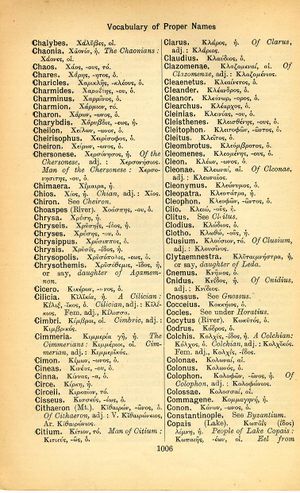Cleopatra
οὐ παντὸς ἀνδρὸς ἐς Κόρινθον ἔσθ' ὁ πλοῦς → it's not for every man to make a journey to Corinth, not everyone can afford a trip to Corinth
English > Greek (Woodhouse)
Κλεοπάτρα, ἡ.
Latin > English (Lewis & Short)
Clĕŏpātră: (on the ā cf. Juv. 2, 109; Luc. 9, 1071; 10, 56; Stat. S. 3, 2, 120), ae, f., = Κλεοπάτρα.
I Queen of Egypt, and daughter of Ptolemy Auletes, notorious for her amorous intercourse with Cœsar, and afterwards with Antony; conquered at Actium by Augustus, Caes. B. C. 3, 103; 3, 107; Suet. Caes. 35; Luc. 10, 354 sqq.; Val. Fl. 4, 464; Mart. 4, 22, 2; 4, 59, 5.—Hence,
B Clĕŏpātrānus, a, um, adj., of or pertaining to Cleopatra: stirps, Treb. Poll. Claud. 1: uniones, id. Trig. Syr. 32.—
II A sister of Alexander the Great, and wife of Alexander, king of Epirus, Liv. 8, 24, 17; Just. 9, 6, 1; 13, 6, 4 al.—
III A daughter of Mithridates, and wife of Tigranes, Just. 38, 3, 3.—
A daughter of I., Just. 39, 3, 1; 39, 4, 7.
Latin > French (Gaffiot 2016)
Clĕŏpătra,¹² æ, f. (Κλεοπάτρα), Cléopâtre,
1 reine d’Égypte : Suet. Cæs. 35, 1
2 l’une des Danaïdes : Hyg. Fab. 170.
Latin > German (Georges)
Cleopatra, ae, f. (Κλεοπάτρα), I) Tochter Philipps von Mazedonien u. der Olympias, Gemahlin Alexanders I. von Epirus, Liv. 8, 24 extr. Iustin. 9, 6 u.a. – II) Tochter des Mithridates, Gemahlin des Tigranes, Iustin. 37, 3. – III) die durch ihren buhlerischen Umgang mit Cäsar u. später mit Antonius berüchtigte letzte Königin von Ägypten, älteste Tochter des Ptolemäus Auletes, Caes. b. c. 3, 103. Vell. 2, 82, 85 u. 87: über ihre Verschwendung s. Plin. 9, 119 sqq. – Plur., Cleopatrarum Ptolemaeorumque gens (Geschlecht), Treb. Poll. trig. tyr. 30, 2. – Dav. Cleopatrānus, a, um, von der Kleopatra herrührend, der Kleopatra, stirps, Treb. Poll. Claud. 1, 1: vasa, uniones, Treb. Poll. trig. tyr. 30, 19 u. 32, 6. – / Cleopatra bei Dichtern mit langer penultima (pā), s. Iuven. 2, 109. Lucan. 9, 1071; 10, 56.

